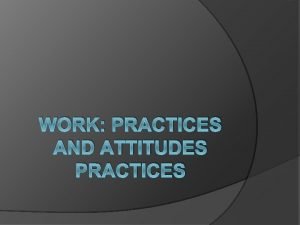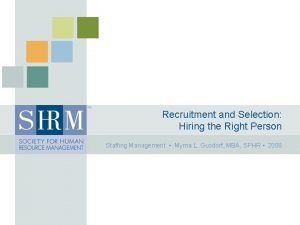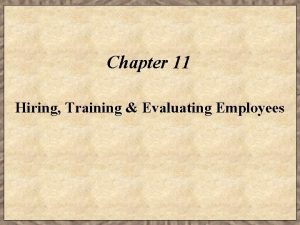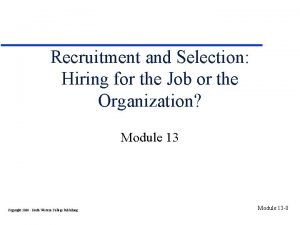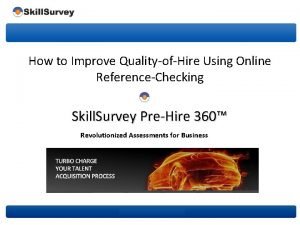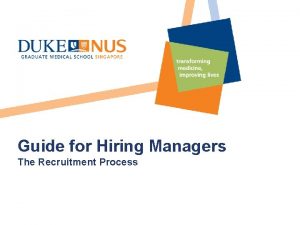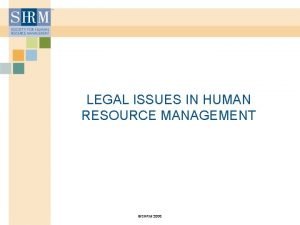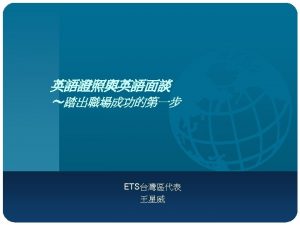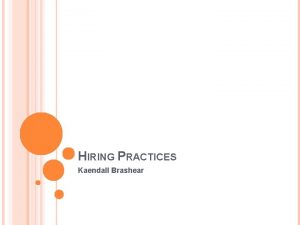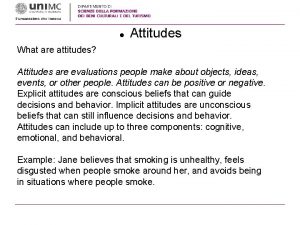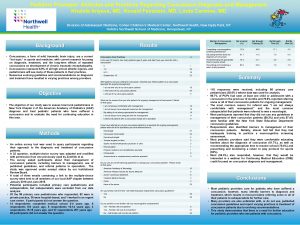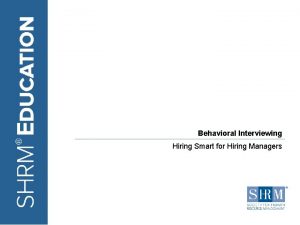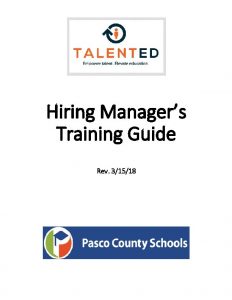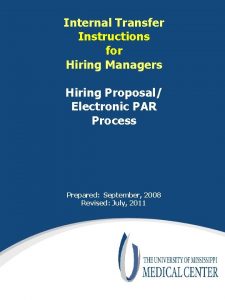Practices and Attitudes Regarding the Hiring of FormerlyIncarcerated



















- Slides: 19

Practices and Attitudes Regarding the Hiring of Formerly-Incarcerated Individuals Sponsored by: The Malta Justice Initiative Inc. Funded by: The Tow Foundation Administered by: Harris Poll 15750891 -v 1 November 2016

Why This Survey? • Prior research shows that getting and holding a legitimate job within the first year of release is the single most important factor in whether a person succeeds on the outside or ends up back in prison Page 2

• It is estimated that as many as 60% of exoffenders do not hold a legitimate job one year after release. This figure correlates with the national recidivism rate of 43% and Connecticut’s recidivism rate which is well over 50%. Page 3

• By contrast, research shows that where exoffenders find and hold jobs throughout their supervised release period, 93% of those individuals do not return to prison. Page 4

• The under-employment of those with a criminal record has devastating economic impacts. • It is estimated that such group accounts for almost 1% of the overall unemployment rate and costs the United State economy as much as $65 billion annually. Page 5

Purpose of the Survey • To understand the current practices, policies and attitudes of employers relative to hiring formerlyincarcerated persons. • Determine employers’ perceptions of the risks of hiring such individuals. • Seek opportunities for legislative or policy initiatives to minimize risks and create incentives for hiring formerly-incarcerated people. Page 6

Executive Summary • A clear awareness gap exists among survey respondents regarding the criminal justice system. • 9 out of 10 Connecticut employers interviewed do not place the topic of criminality as one their top concerns. • Only 17% of people with a role in hiring feel they are extremely knowledgeable of the criminal justice system, 63% say they are somewhat knowledgeable and 20% say they are not at all knowledgeable. Page 7

A Call to Action • 95% of respondents agree that hiring an exoffender has the potential to turn a ward of the State into a taxpayer and productive community member. • 76% would definitely or probably consider hiring a qualified person with a criminal record. • 97% of respondents say that people with a nonviolent criminal record deserve a second chance to succeed in employment. Page 8

Current Challenges in Hiring Practices • 55% of employers surveyed have difficulty finding qualified people for specific jobs and 35% of respondents describe such difficulty as one of their biggest challenges; a majority are willing to hire a person with a criminal record to fill that gap. • 4 in 10 respondents have no experience hiring an ex-offender. • 25% state their companies have a policy against hiring an ex-offender. • 75% of employers do criminal background checks. • Some employers fear it will reflect negatively on their company’s reputation. • Others identify challenges around risk for fraud, theft and their legal liability. • Only 3% actively try to hire a person with a criminal record. Page 9

Recommendations for Driving Better Outcomes • The survey found a strong willingness on the part of Connecticut employers to hire the formerly-incarcerated under certain circumstances, particularly if immunity is given and financial incentives are provided. Page 10

• First, 75% of respondents indicated a willingness to hire a person with a criminal record if they are qualified to perform a job the employer is having trouble filling. • This is significant because 55% of the surveyed employers indicated they have trouble filling certain positions. Page 11

• The foregoing strongly suggests that pre- and post-release education and training should be geared to match the specific needs of employers (e. g. , through pre- or post-release training and internships). Page 12

• Second, there is broad support (73%) for hiring persons with a criminal record if tax credits are provided and/or healthcare coverage is subsidized for up to two years. Page 13

• Third, 76% of respondents stated they were willing to hire a person with a criminal record if salary or training costs were underwritten. Page 14

• Fourth, 63% of employees are willing to consider applicants who have been drug- and crimefree for at least three years. This suggests that criminal records should be expunged after the passage of a specified number of years if the individual has stayed clean. Page 15

• Fifth, A significant majority (77%) of respondents favor providing civil immunity for employers relative to the conduct on the job of a formerly-incarcerated employee, thereby insulating them from negligent hiring and supervision claims. Page 16

• Lastly, 52% of employers surveyed support making it unlawful to discriminate against ex-offenders without sufficient justification (particularly if no private cause of action is allowed). Page 17

Questions to Ponder Who do we want walking out those prison doors? • Do we want a formerly-incarcerated person who has had their addiction, mental illness and trauma history addressed? • Do we want someone with a place to live? • Do we want someone with educational and vocational training? • Do we want someone who will be supervised upon their release? • Do we want someone who can get a job? • Do we want someone with a realistic chance to become a productive tax paying citizen, rather than someone who ends up back in prison at a cost of $51, 000 a year? Page 18

Who is MJI? Malta Justice Initiative has been working toward criminal justice reform for many years. In 2014, we released our book entitled, The Justice Imperative, which includes a 30 point plan designed to the reduce cost and collateral damage from mass incarceration, while not jeopardizing public safety. If you would like to become involved, please visit our website www. maltajusticeinitiative. org and join our many supporters. “Never doubt that a small group of thoughtful, committed citizens can change the world; indeed, it’s the only thing that ever has. ” Margaret Mead Page 19
 Work practices and attitudes
Work practices and attitudes Recruitment and selection difference
Recruitment and selection difference Selection in staffing
Selection in staffing Hiring training and evaluating employees
Hiring training and evaluating employees Difference between hiring and recruitment
Difference between hiring and recruitment Skill survey healthcare hiring
Skill survey healthcare hiring Manpower recruitment process flowchart
Manpower recruitment process flowchart Target local hire program
Target local hire program Targeted local hiring program
Targeted local hiring program Geico hiring process
Geico hiring process Campus hiring
Campus hiring National park service resume
National park service resume Negligent hiring in hrm
Negligent hiring in hrm Ameren hiring process
Ameren hiring process Uab adminsystem
Uab adminsystem Initial assessment methods for hiring
Initial assessment methods for hiring Histology resume
Histology resume Schedule a hiring authority 5 cfr 213,3102(u)
Schedule a hiring authority 5 cfr 213,3102(u) Targeted local hire program agency referral form
Targeted local hire program agency referral form 29 cfr 1910 regarding face head foot and hand protection
29 cfr 1910 regarding face head foot and hand protection
